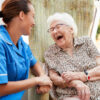You may have noticed a lot of pink around this month because October is Breast Cancer Awareness Month. Although survival rates from breast cancer are at an all-time high, breast cancer still devastates many families each year.
In addition to preventive screening, some women are using genetic tests for breast cancer to measure their risk. However, it can be confusing to know who should get genetic testing. Here’s some information to help you or loved ones in that decision.
What kind of genetic testing is available for breast cancer?
The tests that are available focus on BRCA1 or BRCA2 gene mutations. Having the BRCA1 or BRCA2 gene mutation is associated with a higher risk for breast or ovarian cancer, according to the National Cancer Institute. Some tests check for harmful mutations from both genes. Other tests evaluate for mutations from a variety of genes that are linked with a higher risk of breast and ovarian cancer, including BRCA1 and BRCA2.
Who should get genetic testing for breast cancer?
Generally speaking, women who with family members who have had breast, ovarian, fallopian tube, or peritoneal cancer should be evaluated for a BRCA1 or BRCA2 gene mutation, according to the U.S. Preventive Services Task Force. Your health provider can use a variety of resources online to determine whether you should have genetic testing. However, some factors that have a greater association with these gene mutations include cancer diagnosed before age 50, cancer in both breasts in the same women, male breast cancer, and multiple breast cancers in the family, the National Cancer Institute reports.
It is also helpful to speak with a genetic counselor before and after genetic testing, to help you evaluate and cope with the results.
Will insurance pay for genetic testing for breast cancer?
It depends. Ask your insurance provider. “Medicare covers BRCA1 and BRCA2 mutation testing for women who have signs and symptoms of breast, ovarian, or other cancers that are related to mutations in BRCA1 and BRCA2 but not for unaffected women,” the National Cancer Institute reports.
How do the tests work?
Tests typically require a blood or saliva sample that is sent to a lab. Results usually come back within a month.
How will the test results affect me?
If you’re found to be at a higher risk for breast cancer, health providers may recommend you have enhanced or more frequent screening. Prophylactic surgery to lower your risk for breast cancer also may be advised.
For detailed information about genetic testing for breast cancer, read this resource from the American Cancer Society or the resource we references from the National Cancer Institute.
Call Secure Aging to Find Out How We Can Help Seniors With Financial Management
At Secure Aging in Bradenton, we transform the weight of the world into a sigh of relief for our senior clients and their concerned family members. The mission of Secure Aging is to protect and preserve our client’s independence and dignity through careful and thoughtful financial and care management. As our clients age, it is their desire to remain independent and age with dignity. Our services protect our clients from talented con artists looking to exploit and deplete the financial resources of our vulnerable seniors. Secure Aging helps families in Manatee County and Sarasota County and in and around the communities of Anna Maria, Bradenton, Bradenton Beach, Ellenton, Holmes Beach, Lakewood Ranch, Longboat Key, Myakka City, Palmetto, Parrish, and Sarasota. Call us at 941-761-9338, or visit us online at www.secureaging.com.
















